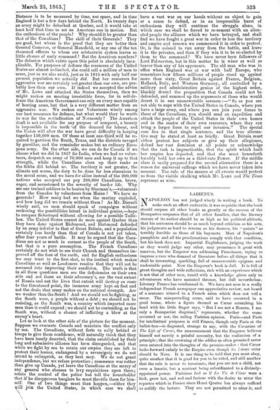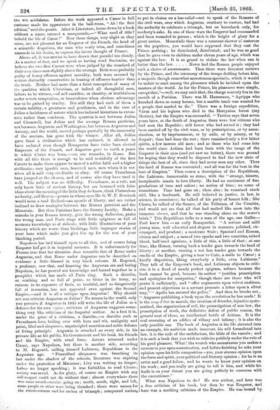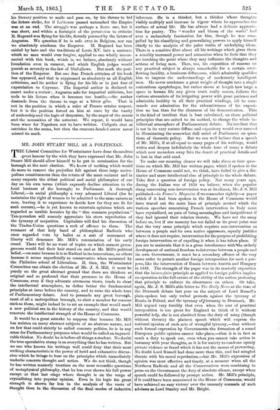LABLENUS.
NAPOLEON has not judged wisely in writing a book. To make such an effort endurable it was requisite that the book should surpass all other books as greatly as the success of the Bonapartes surpasses that of all other families, that the literary stature of its author should be as high as his political altitude, that his sentences should be as much beyond criticism as his acts,. his judgments as hard to reverse as his decrees, his " points " as terribly forcible as those of his bayonets. Most of Napoleon's pamphlets and all his proclamations comply with that condition, but his book does not. Impartial Englishmen, judging the work as they would judge any other, may pronounce it great with reserves, but the Emperor was addressing Frenchmen, trying to impress a race who demand of literature before all things that it shall be interesting, sparkling, full of unanswerable epigram and undeniable point. Now the Emperor's book is dull. It is full of great thoughts and wide reflections, rich with an experience which is not that of other men, tumid with a knowledge given only to. adventurers who have mounted thrones, but dull nevertheless, Literary France has condemned it. We have not seen in a really independent French newspaper one appreciative review, not heard of a sentence uttered in a French salon which does not veil a sneer. The masquerading scene, said to have occurred in a good house, where a figure dressed as Cwsar scratching his head with his little finger says, "But I am not a Roman, I am only a Bonapartist disguised," represents, whether the scene occurred or not, the ruling Parisian opinion. Paris—and Paris for intellectual purposes is still France, though only Paris at the ballot-box—is disgusted, strange to say, with the Cxsarism of The Life of Cm3ar, the announcement that the Emperor believes himself not merely a painful necessity, but the realization of a principle ; that the crowning of the edifice so often promised never even entered into the thoughts of the promise-maker : that Czesar looks forward calmly to the Empire even though its Lmture ruler should be Nero. It is one thing to be told that you must obey, quite another that it is good for you to be ruled, and still another that the rule is never to terminate, that you are not a child, not even a lunatic, but a sentient being subordinated to a divinely- appointed power. Parisians feel as if La Vie de Clear were a kick, grow hot, and red and furious with the desire to utter the repartee which in France since Henri Quatre has always sufficed to nullify the lecture. They are not permitted to utter it, and
the wit acidulates. Before the work appeared a Cesar in full costume, made his appearance in the ball-room, " Ah ! the first edition" said the guests. After it Literature, borne down by a book without a name, entered a masquerade,—" What need of title? behold the life of Cesar!" Now those things, very slight as they -seem, are not pleasant for an Emperor of the French, the head of a scientific despotism, the man who really tries, and sometimes succeeds in his desire, to express the latent thought of France.
Above all, it was unwise to have drawn that parallel too closely. As a matter of fact, and we speak as having read Suetonius, we believe the two first Cresars were when judged by the standard of their o n times men slightly above the average. Both were probably guilty of heavy offences against morality, both were accused by writers distinctly conservative in leaning of offences heavier than the truth. Neither had more than a faint conception of many of the qualities which Christians, or indeed all thoughtful men, believe to be virtues,—of self-sacrifice, or chastity, or truthfulness under severe temptation, or benevolence when obvious advantage was to be gained by cruelty. But still they had each of them a certain nobility, a greatness and gentleness, and in the case of Julius a lavishness of nature which has induced historians to exten- uate rather than condemn. The question is not between Julius and Cromwell, but Julius and the average Roman patrician, not between Augustus and Washington, but between Augustus and Antony, and the world, moved perhaps partially by the immensity of the success, has gone with the winner. After all, Julius gave Gaul a civilization which has endured, is allowed to have endured even though Bonapartes have twice been elected Emperors of the French, and Augustus gave to earth a peace in which Christ was born,—not, one remarks, in Rome. But with all this there is enough to be said truthfully of the first Cresars to make them appear to men of a nobler faith and a higher civilizatioa very ignoble men, besotted men, men whom it is not when all is said very creditable to obey. Of course Frenchmen have jumped at the. chance, and of course also they have used it well. The subject was no difficulty. Frenchmen, as a rule, not only know little of ancient history, but are bemused with false ideas about the meaning of the little they do know, think Plutarch an authority, call Brutus—person in whose eyes Mr. (*.W. P. Bentinck would seem a mad Radical—an apostle of liberty, and are rather inclined to draw analogies between the Roman patriciat and the -Mountain. But then Parisians have the literary faculty. Make a mistake in your Roman history, give the wrong deduction, praise the wrong man, and Paris rings with little epigrams as full of accurate knowledge as of ridicule, with little illustrations of your history which are worse than hirelings, little improper stories of your hero which make you give hint up for the rest of your thinking period.
Napoleon has laid himself open to all this, and of course being Emperor hai got it in imperial measure. It is unfortunately for France true that her situation does resemble that of Rome under Augustus, and that Rome under Augustus can be described on evidence a little biassed in very black colours. M. Rogeard, a professor, saw that, and knowing the Augustan era and hating Napoleon, he has poured out knowledge and hatred together in a pamphlet which has made all Paris ring. Such a diatribe, so scathing and so full of point, so bitter in its irony, so ruinous in its exposure of facts, so truthful,and so dangerously full of invention, has not appeared even against the Second Empire,—and it is all a critique upon Augustus ! Why should not one criticize Augustus or Julius? No reason in the world, only you perceive if Augustus in 1865 will write the life of Julius as a defence for his own regime, criticism of Augustus suggests some- thing very like criticism of the Imperial author. As a fact it is, under the guise of a criticism, a diatribe,—a diatribe such as Frenchmen love, boiling over with hate and wit, malignity and point, libel and eloquence, unprincipled assertion and noble defence of living principle. Augustus is attacked on every side, in his private life as his public, his Government and his book, his friends and his Empire, with cruel force. Astrea returned under Cesar, says Napoleon, but there is another side, according to M. Rogeard, calling himself Labienus, Republican in the Augustan age. "Proscribed eloquence was breathing its last under the shadow of the schools, literature was expiring under the protection of Mecenas ; Livy was writing no longer ; Labeo no longer speaking ; it was forbidden to read Cicero ; society was saved. As for glory, of course an Empire with any self-respect could not do without that ; almost everywhere there was some sword-exercise going on ; north, south, right, and left, some people or other were being thrashed ; there were names for the street-corners and for arches of triumph ; conquered nations
to put in chains on a bas-relief--not to speak of the Romans of the civil wars, over which Augustus, contrary to custom, had had the audacity to celebrate a triumph, but on' horseback only, for modesty's sake. In one of these wars the Emperor had commanded and been wounded in person ; which is the height of glory for a great nation. Meanwhile there was a constant shower of sesterces on the populace, you would have supposed that they cost the Prince nothing; he distributed, distributed ; and he was so good that he gave even to children under eleven years of age, which was against the law. It is so grand to violate the law when one is
better than the law Never had the Roman people enjoyed such a choice of amusements. Then there were frequent reviews by the Prince, and the ceremony of the troops defiling before him, a majestic though somewhat monotonous spectacle, which it would be unfair to omit among the pleasures which he lavished upon the masters of the world. As for the Prince, his pleasures were simple, except that,"—well, we may omit that, the charge scarcely lies in the mouth of a Parisian. There was M. Hausmann, "Agrippa who knocked down so many houses, but a marble tomb was wanted for a people that needed to die." There was a foreign expedition, Varus and his legions who died in the Hercynian forest (say Mexico), but the Empire was successful. " Tacitus says that seven years later, at the death of Augustus, there were few citizens who had seen the Republic ; still fewer, who had served it ; they had been carried off by the civil wars, or by prcfscriptions, or by assas- sination, or by imprisonment, or by exile, or by misery, or by despair ; time had done the rest ; there remained only a few bitter spirits, a few morose old men ; and as those who had come into the world since Actium had been born with the image of the Emperor in their eyes (and yet saw no better), there was ground for hoping that they would be disposed to find the new state of things the best of all, since they had never seen any other. Thus the herd of Remus was contented ; and all was for the best in the best of Empires." Then comes a description of the Republican, the Labienus, immoveable as stone, with the "strange, bizarre, inexplicable mania to love liberty. He had no sentiment of fine gradations of tone and colour; no notion of time ; no sense of transitions. Time had gone on ; ideas also ; he remained stock still, like a landmark. He still believed in justice, in law, in science, in conscience ; he talked of his party of honest folk ; like Cicero, he talked of the Senate, of the Tribunes, of the Comitia, and would not see that all that had melted like snow into the immense cloaca, and that he was standing alone on the sewer's brink." This Republican talks to a man of the age, one Gallio- Paul knew him — an early Bonapartist. "A serious and mild young man, well educated and elegant in manners, polished, cir- cumspect, and prudent ; a moderate Stoic ; Spaniard and Roman, citizen and subject ; a man of two epochs and two countries, mixed blood, half-bred opinions, a little of this, a little of that ; at one time, like Homer, turning back a tender gaze towards the land of liberty ; at another, turning a not less tender gaze towards the cradle of the Empire, giving a tear to Cato, a smile to Cesar; a kindly disposition, liking everybody a little, even Labienus." They talk of the Emperor's book, and Labienus objects to criti- cize it in a flood of nearly perfect epigram, refuses became the book cannot be good, because its author "justifies proscription and apologizes for usurpation," though there are those who will praise it sufficiently, and "offer arguments upon velvet cushions, and present objections as a servant presents a letter upon s silver tray,"" Apollo has entered the police." And then he breaks out., "Augustus publishing a book upon the revolution he has made ! It is the coup d'elat in morals, the creation of disorder, injustice syste- matized, the organization of evil, the promulgation of non-law, the proscription of truth, the definitive defeat of public reason, the general rout of ideas, an intellectual battle of Actium. It is the real crowning of an edifice of villany and infamy ; it is also the only possible one. The book of Augustus is his life elevated into an example, his ambition made innocent, his will formulated into law, it is the code of the malefactors, the bible of the rascals ; and it is such a book that you wish to criticize publicly under the rule of his good pleasure. What ! the wretch who assassinates you makes a sermon to you upon assassination, and before finishing he asks your opinion upon his little composition —yes, your sincere opinion upon the form and spirit, your political and literary opinion ; for he is an artist and a good fellow, and he wants to know your opinion on his work ; and you really are going to tell it him, and while his knife is on your throat you are going politely to converse with the executioner."
What was Napoleon to do ? He was author, and here was a free criticism of his book, but then he was Emperor, and here was a scathing criticism of the Empire. He was bound by his literary position to smile and pass on, - by his throne to bid the lictors strike, for if Labienus passed untouched the Empire was at an end. The -struggle was perhaps a fierce one, but it was short, and within a fortnight of the permission to criticize M. Rogeard was flying for his life, fiercely pursued by the lictors of Augustus. We .question if he is safe even in Belgium, nor can we absolutely condemn the Emperor. M. Rogeard has been misled by hate and the traditions of Louis XV. into a sentence which no man would ever forgive, applied to one wholly uncon- nected with this book, which is, we believe, absolutely without foundation even in rumour, -and which English judges would punish as severely as the law- of libel allows. But mark the posi- tion of the Emperor. But one free French criticism of his book has appeared, and that is suppressed as absolutely as all English criticisms, and its author is flying for his life or in just fear of expatriation to Cayenne. The Imperial author is declared to smart under a review ; Augustus asks for impartial criticism, but nods to his lictors when it becomes too hostile,—the author descends from the throne to rage at a bitter gibe. That is not in the position in -which a ruler of France retains respect, but it is the position forced on him at once by the vanity of authorship and the logic of despotism, by the anger of the orator and the necessities of the autocrat. We repeat, it would have been -wiser for Napoleon not to have written. Caligula shot at ostriches in the arena, but then the crescent-headed arrow never missed its mark.
































 Previous page
Previous page